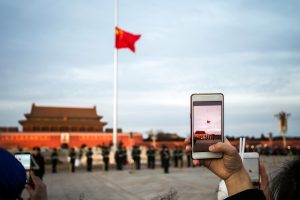After escalating revelations about President Donald Trump’s interactions with Ukrainian leader Volodymyr Zelensky, the whistle-blower complaint at the heart of them has finally been released. And while parts have been redacted, the nine-page document details not only what took place in a controversial July 25 conversation between the two heads of state, but how the White House appears to have tried to cover it up. You can read it for yourself right here.
Prior to the House Intelligence Committee releasing the complaint, Democratic members had already described it in ominous terms. “This thing is bigger than I thought,” wrote Texas representative Joaquin Castro on Twitter. “I think it is a blueprint for what we still need to know,” Illinois representative Mike Quigley told CNN.
Those tidings apparently referenced at least one aspect of the complaint that had not previously become public. The White House released a readout of that July 25 call, in which Trump appears to pressure Zelensky to investigate Hunter Biden, son of Democratic presidential hopeful and former vice president Joe Biden. “In the course of my duties, I have received information from multiple US government officials that the president of the United States is using the power of his office to solicit interference from a foreign country in the 2020 US election,” the complaint reads. The whistle-blower did not listen to the call directly, but does accurately describe what was eventually seen in the rough transcript: Trump pushing for an investigation, asking about cybersecurity firm CrowdStrike, and suggesting meetings with attorney general William Barr and Rudy Giuliani, Trump’s personal attorney.
“The White House officials who told me this information were deeply disturbed by what had transpired in this phone call,” the whistle-blower wrote.
What follows, though, had not been previously disclosed. The whistle-blower alleges that White House officials took steps to “‘lock down’ all records of the phone call,” including removing the digital transcript from the system it would have gone to under normal procedure, and instead loading it into “a separate electronic system that is otherwise used to store and handle classified information of an especially sensitive nature.” The report says more specifically that the call records wound up in a system managed by the National Security Counsel Directorate for Intelligence Programs Systems, usually reserved for “covert action” and similarly classified intel.
The report further details follow-up meetings between Ukrainian leadership and US officials, as well as with Giuliani. Much of the remainder concerns Giuliani’s unusual insertion into foreign policy regarding Ukraine, given his status as a private citizen, and various personnel and policy changes that appear to have been motivated at least in part by pressure from Trump.
The path the complaint has taken thus far has itself been thorny. Originally filed in August to the inspector general for US intelligence agencies, the Justice Department’s Office of Legal Counsel determined that it should not make its way to Congress, arguing that because it applied to Trump it was outside of the inspector general’s purview. The Justice Department’s criminal division then dismissed the complaint, reportedly without opening a formal investigation.
As the complaint’s existence became known in late September, Congress pushed for the document to be shared. Trump’s acting director of national intelligence, Joseph Maguire, declined. In a congressional hearing Thursday morning, Maguire cited executive privilege as the reason he withheld the report. The House intelligence committee head, Adam Schiff, a Democrat from California, pushed back on Maguire’s deference to the White House and the Justice Department, given that the report implicates both directly.
The report found its way to the House Intelligence Committee on Wednesday, though, which quickly made the bulk of its contents public. This is also only the beginning. Schiff himself said Tuesday that the whistle-blower—whose identity remains unknown, even to Maguire—could testify as early as this week. In the meantime, you can read their detailed concerns for yourself.
More Great WIRED Stories
- TikTok—yes, TikTok—is the latest window into China’s police state
- How cities reshape the evolutionary path of urban wildlife
- The iOS 13 privacy and security features you should know
- The “smart kitchen” is very stupid
- Artificial intelligence confronts a “reproducibility” crisis
- 👁 How do machines learn? Plus, read the latest news on artificial intelligence
- 🏃🏽♀️ Want the best tools to get healthy? Check out our Gear team’s picks for the best fitness trackers, running gear (including shoes and socks), and best headphones.



